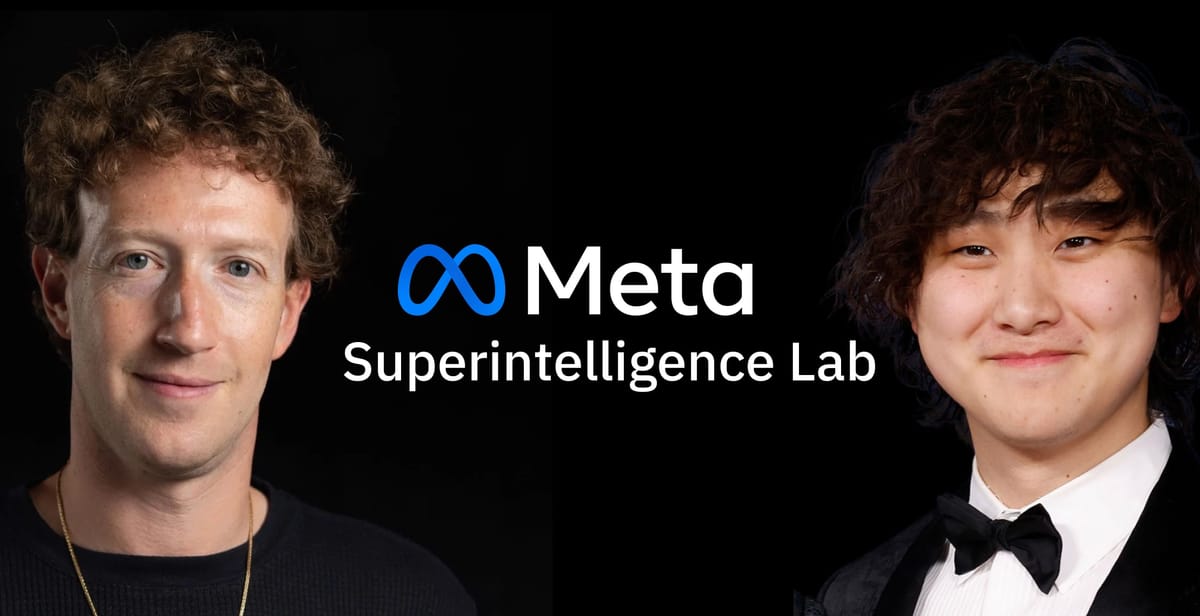Meta CEO Mark Zuckerberg just restructured his company's entire artificial intelligence operation around a single goal: building superintelligence. In an internal memo sent Monday, Zuckerberg announced that all teams working on AI at Meta will now fall under a new group called Meta Superintelligence Labs.
Key Points
- All AI units now sit inside Meta Superintelligence Labs, reporting directly to Zuckerberg.
- Scale AI founder Alexandr Wang is chief AI officer; ex-GitHub CEO Nat Friedman co-leads product and applied research.
- Meta spent $14.3 billion for a 49 percent stake in Scale AI and poached eight researchers from OpenAI, DeepMind, and Anthropic.
- The push leans on open-source Llama 3 models and in-house MTIA chips to slash NVIDIA bills.
The restructuring puts Alexandr Wang, the 28-year-old founder and former CEO of Scale AI, in charge as chief AI officer. Wang will partner with Nat Friedman, the former GitHub CEO, who will lead Meta's AI products and applied research efforts. It's a major organizational shift that signals Zuckerberg's determination to catch up in the AI arms race.
"As the pace of AI progress accelerates, developing superintelligence is coming into sight," Zuckerberg wrote in the memo, viewed by Bloomberg. "I believe this will be the beginning of a new era for humanity, and I am fully committed to doing what it takes for Meta to lead the way."
The consolidation comes as Meta faces mounting pressure in AI development. The company's flagship Llama 4 "Behemoth" model has been repeatedly delayed due to performance issues, with engineers worried it won't match Zuckerberg's bold public claims about its capabilities. Meanwhile, eleven of the 14 original researchers who created Meta's breakthrough Llama model have left the company.
Wang brings a different profile than typical AI research leaders. Rather than coming from an academic background, he built Scale AI into the critical infrastructure company that provides training data for major AI systems including ChatGPT. Meta acquired a 49% stake in Scale earlier this month for $14.3 billion, primarily to secure Wang's leadership for this new superintelligence effort.
The restructuring also reflects Meta's aggressive talent acquisition campaign. The company has hired 11 new AI researchers from top competitors, including several previously unreported additions. The group includes former DeepMind researchers Jack Rae and Pei Sun, multiple OpenAI researchers who worked on reasoning models like Jiahui Yu and Shengjia Zhao, and Anthropic's Joel Pobar.
Zuckerberg has been personally leading the recruitment drive, meeting with potential hires at his homes in Lake Tahoe and Palo Alto while offering compensation packages reportedly reaching seven to nine figures. The CEO has even rearranged Meta's office layout so new AI hires sit near him.
The new organization structure is designed around an audacious goal: developing AGI that matches human capabilities across broad domains, then pushing beyond to superintelligence that surpasses human performance entirely. Current AI systems excel at specific tasks but lack the flexible reasoning and learning abilities humans take for granted.
Meta's superintelligence lab could become a key internal group that powers products throughout the company, similar to how Google's DeepMind unit operates. The company has ambitious plans to build AI agents for business applications and needs frontier AI models to power them competitively.
Meta's struggles highlight the enormous stakes involved. The company plans to spend up to $65 billion on AI infrastructure this year alone, building massive data centers to train increasingly powerful models. Recent reports suggest Meta has even explored seeking external funding from competitors like Amazon and Microsoft for its AI development through a proposed "Llama Consortium."
The consolidation under Meta Superintelligence Labs represents Zuckerberg's biggest organizational bet on AI yet. Rather than having AI research scattered across different teams, the new structure puts all efforts under unified leadership with a clear mission: achieving superintelligence before competitors.
Meta says it will share more details about the new organization and additional hires in the coming weeks, suggesting the restructuring is just the beginning of major changes ahead.

